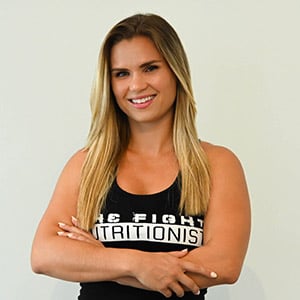When you're on the way to the gym, what's the best snack to grab? A granola bar? An apple? What about a sandwich? So many possibilities to choose from, but what's the best option? Well, much of that will largely depend on the type of workout you are going to do!
Nutrient timing and what to eat before a workout is covered in chapter 12 of the NASM Nutrition Coach Certification Course. Check it out!
Breaking Down Energy Basics
First, let's review the energy system basics.
When we exercise at various intensities, our body will utilize various fuel sources. The first form of energy that is available is free ATP in our muscles, which supplies about a few seconds of energy. Next, we have our phosphocreatine system which provides up to 15 seconds of energy. After that, we enter into anaerobic glycolysis, which maxes out after about 2 minutes, and once exercise exceeds 2 minutes, we enter aerobic glycolysis which can supply energy for hours.
To power these different energy systems, our body needs fuel. The two main macronutrients that will supply energy to these systems are carbohydrates and fats. However, carbohydrates are the easiest to break down, are the body’s preferred fuel source of energy, and are the ONLY macronutrient that can supply or regenerate energy for 90% of the systems previously mentioned. Fats can only be metabolized in time to provide sufficient fuel during aerobic glycolysis.
However, when are these systems active? Well as you can imagine, the duration of each system gives hint to the type of workout in which the energy system would be dominant. High intensity, short, power bouts will mostly utilize the phosphocreatine and anaerobic glycolysis pathways. Hence, carbohydrates will be the main macronutrient to supply the body with energy for these types of workouts. Long duration events will require the use of carbohydrates and fats for fuel.
So now that we’ve covered energy systems, let’s review what and when you should eat before a workout!
Setting Up a System
As aforementioned, carbohydrates are the predominant fuel source for high-intensity or prolonged exercise. Daily needs vary on the duration, frequency, and intensity of the activity — but can range from 3-13g/kg per day.
In regards to carbohydrate consumption before exercise, it is recommended to consume at least 1g/kg of high glycemic index carbohydrates or about 0.5g/lb. at least 1 hour before maximizing glycogen stores. However, research has also shown consumption of 30-60g of carbohydrates 30 minutes to 1 hour before exercise can increase carbohydrate availability towards the end of an exhaustive workout and prevent early fatigue.
What if you have an important event coming up? Can you increase carb consumption earlier in the day and still have enough fuel for the competition? Absolutely!
For anyone participating in a high-intensity event, it is recommended to consume 2.5-4g/kg of carbohydrates 3-4 hours before the event.
What Types of Carbs Should You Consume?
The rule of thumb for choosing carbohydrate sources is the closer you are eating to your workout, the simpler the carbohydrate source should be. Simple as in a source that breaks down very easily and has little to no fiber!
Sources such as white rice or potatoes, cereals/cereal bars, bananas, apple sauce, bagels or white bread, and sports drinks are all great examples. Incorporating complex sources such as whole grains or legumes is more beneficial when eating 2-4 hours before exercise.
Is protein safe to consume before a workout? The answer to that question is that there is never a bad time to consume protein! However, protein is not an energy source during exercise — it plays role in recovery and regeneration.
Pack on the Protein
Consumption of protein before exercise can promote positive muscle protein balance and mitigate muscle damage and post-exercise soreness. Daily needs can vary between 1.0-and 2.2g/kg per day. In regards to timing, research suggests the most pragmatic approach for protein consumption is to consume 20-30g every 3-4 hours.
Since protein can be difficult to digest quickly, it would be beneficial to consume more processed sources in doses of 5-10g 30 minutes before your workout. Examples would include whey protein or amino since these are in their simplest form.
Fats to the Rescue
Finally, let’s discuss fats! Fats take the longest to be metabolized and can also slow the digestion of other foods when consuming mixed meals. Due to this, it is recommended to include fats in a meal 2-4 hours before exercise. When feeding windows are limited to an hour or less, carbohydrates are going to be the best fuel source for immediate energy.
Research has not yet suggested specific fat recommendations before exercise, however, general recommendations range between 1-2.2g/kg per day depending on activity or 20-35% of total daily intake.
Putting It All to Practice
With all this information, how can we apply this to food? Below are examples of various pre-workout meals you can consume at various points before exercise following the guidelines discussed in this blog! Remember, servings are largely dependent on the size of the individual. To simplify calculations, we’ll stick to a 2:1 carbohydrate to protein ratio.
3-4 hours before:
- 4oz ground turkey, 5oz medium sweet potato, 1/2 c. black beans, 5oz roasted broccoli
- 4oz salmon, 1 c. wild rice, 1/2 avocado, 5oz green beans + 1 bread roll
2-3 hours before:
- 2-3 eggs, 1/2 avocado, 1 banana, 1 English muffin
- Ham Sandwich (2 slices bread, 3-4oz ham, lettuce, tomato, 1 tbsp mayo) + 1 banana
30 minutes - 1 hour before: Carbohydrate dominant (at least 30-60g)
- 1/2 c. oatmeal, 1/2 banana, 1oz granola, honey drizzle
- 1 banana or granola bar
- 1 white bagel w. 3oz deli turkey
Is it okay to work out on an empty stomach?
There is no extreme harm that will come to you if you work out fast! Our body has energy reserves in our liver, muscle glycogen, and adipose tissue that will allow us to perform work even in the absence of food! However, your last meal will largely depend on how much available energy you have since glycogen stores are limited and are depleted first when performing an exercise. Another downside to fasted workouts is that it leads to increased muscle breakdown. Therefore, consuming a meal immediately after a fasted workout is very important!
Pre-Workout Facts
What about pre-workout meals to build muscle or lose weight? There is no specific “meal” to consume before exercise to achieve these goals, however, there are strategies to implement that can be helpful. Consumption of a high protein diet will both help build muscle and lose weight! Therefore, the implementation of 5-10g protein 1 hour to 30 minutes before exercise might be a nutrient timing tactic you’ll want to start.
For someone building muscle, getting ample carbohydrates before exercise will maximize energy during a workout. For someone aiming to lose weight, it would be advisable to consume smaller portions of carbohydrates before exercise to stay in a calorie deficit.
Overall, nutrient timing is a very useful tactic to maximize energy availability during exercise. So, let’s recap the best timing strategies for maximal benefit!
• Ingest a pre-exercise meal 4-6 hours before exercise or competition. The meal should contain 20-30g of protein and 2.5-4g/kg of carbohydrates. The inclusion of healthy fats to delay gastric emptying and increase satiety can also be beneficial.
• 30-60 minutes before exercise consumes 30-60g of high glycemic index carbohydrates + 5-10g protein to prevent early fatigue.
• If consuming carbohydrates within an hour of exercise, choose simple, high glycemic index carbohydrates!
Reference
Kreider, R. B. (2019). Essentials of exercise & sport nutrition: science to practice. Lulu Publishing Services.

















